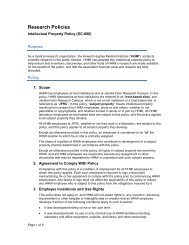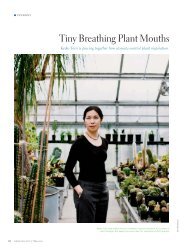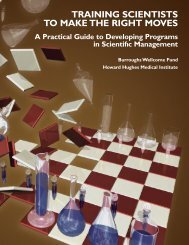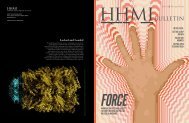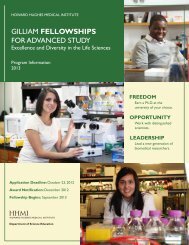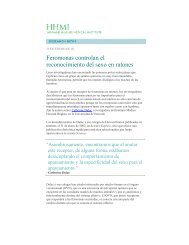Writing a Letter of Recommendation - Howard Hughes Medical ...
Writing a Letter of Recommendation - Howard Hughes Medical ...
Writing a Letter of Recommendation - Howard Hughes Medical ...
Create successful ePaper yourself
Turn your PDF publications into a flip-book with our unique Google optimized e-Paper software.
Making the Right Moves A Practical Guide to Scientific Management<br />
trust your judgment. But don’t go overboard and make the letter about yourself!<br />
For example, “During my years <strong>of</strong> training as a postdoc and now as a faculty<br />
member, I have worked with and personally trained more than xx graduate<br />
students in laboratories at the University <strong>of</strong> Michigan, Harvard <strong>Medical</strong> School,<br />
and, currently, at Emory University. In my opinion, candidate x is among the<br />
top 5 percent <strong>of</strong> the graduate students I have known.” (You may want to include<br />
students you trained as a postdoc, if you have not yet had many students in your<br />
own lab.)<br />
Present the Candidate Truthfully but Positively<br />
Devote several paragraphs to discussing the candidate’s scientific work and<br />
personality, following the suggestions below.<br />
Be specific. Give meaningful examples <strong>of</strong> achievements and provide stories or<br />
anecdotes that illustrate the candidate’s strengths. Don’t just praise by using generalities<br />
(such as “quick learner”), but say what the candidate did to give you that<br />
impression. These details will show you have a strong relationship and also bring<br />
the candidate alive on the page. If the candidate works in your laboratory, make<br />
sure the letter talks about his or her specific contributions to the lab’s research.<br />
♦ “Student x is the first person to successfully master in vivo imaging in my<br />
laboratory and did all the trouble-shooting calibration and testing completely<br />
independently.”<br />
♦ “Student x is the first student in my lab to have a first-author Cell paper.<br />
She contributed data for five <strong>of</strong> the figures and made an important<br />
intellectual contribution to the experimental design and to writing the<br />
discussion.”<br />
♦ “Candidate x’s research was submitted as an abstract and was accepted for<br />
a podium presentation at the American Association for Cancer Research<br />
national meeting earlier this year. Although<br />
she is an undergraduate student,<br />
I treated candidate x in the same manner<br />
I would treat an experienced graduate<br />
student by having her prepare and present<br />
the talk independently. At the meeting,<br />
she presented the work and answered all<br />
the questions from the audience in a clear<br />
and pr<strong>of</strong>essional manner. After the talk<br />
several scientists came up to express how impressed they were with the<br />
presentation.”<br />
Tip: Don’t make the letter too short, because<br />
it will give the reader a negative impression <strong>of</strong> the<br />
candidate. <strong>Letter</strong>s <strong>of</strong> recommendation should be<br />
between one and two pages.<br />
4 BWF ♦ HHMI




